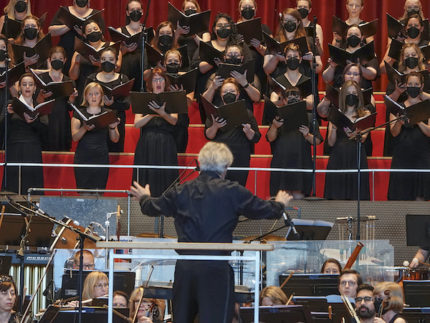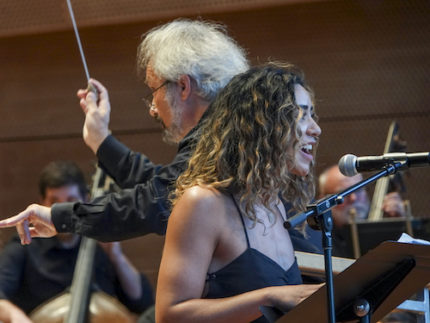Grant Park Chorus makes its first appearance of the summer in two Chicago premieres

The second program of the season for the Grant Park Music Festival brought the first appearance of the summer for the Grant Park Chorus, which was heard in two works having their Chicago debuts Friday night.
The main course on the menu was Mischa Zupko’s Blue Matter. Originally scheduled for 2020, this festival commission was heard in its pandemic-delayed world premiere, with Carlos Kalmar leading the Grant Park Orchestra and Chorus.
While the work was commissioned “to celebrate the important legacy of Chicago’s vibrant musical culture,” Zupko focuses on predominantly African-American musical genres—which makes some sense since Chicago is deservedly renown for its rich history of jazz and blues artists than traditional classical composers.
Inspired by “Ray,” a poem written by young Chicagoan Natalie Rose Richardson about Ray Charles, Zupko asked her to write two additional poems to serve as texts for his work.
The first of three sections, “The music knows,” launches the work with high energy. Richardson’s text paints the difficult lives of her parents and others who grew up in poverty and labored under racism, later segueing into a depiction of Chicago and the salvation of music (“The music knows, knows something we don’t….Follow the sounds/it leads you to a better place.”)

Im the middle movement, Richardson reads her Ray Charles poem over backing chorus and orchestra because, Zupko says, “No melody could improve on Natalie’s delivery.” In the final section, “Hip-hop ode” the text reflects the energy, sensuality and “quick violence” of the populist genre and its embrace by the community.
Richardson’s stanzas are vibrant and evocative and the poet read “Ray” with fine diction and great feeling, including some artfully sung words as well.
Zupko’s music kicks up bracing energy in the outer movements, with snappy, jazz-inflected rhythms in the first section that feel like echoes of Leonard Bernstein’s driving, urban score for On the Waterfront.
The music effectively undergirds the narrative reading of “Ray,” and the finale reflects something of the hip-hop genre with music of fast, aggressive vehemence and a multiplicity of percussion including what sound like upside-down buckets (a heartening symbol of youthful musical energy for some and the bane of existence for many downtown businesses and residents).
Imbued with rousing vitality, Blue Matter succeeds in its mission of providing a lively and celebratory work for GPMF while also checking the obligatory Chicago-centric and diversity boxes.
Yet musically, Zupko’s work is a disappointment. While the composer delivers ample vitality with his colorful orchestral scoring, the choral writing is sorely lacking in finesse and sophistication. For most of the 22-minute duration, the chorus just sings the text full out at maximum volume in declamatory fashion, which gets tiring to hear (and, one imagines, to sing) after a few minutes. There is little variety or ingenuity in the vocal writing, and even the committed and polished singing of the Grant Park Chorus, well prepared by Christopher Bell, couldn’t disguise the paucity of invention in their music.
Kalmer led a typically energized and committed performance that provided the best possible advocacy for this premiere, drawing impassioned playing from the orchestra, not least the hard-working percussionists.
The Zupko premiere was preceded by another choral work, Judith Weir’s We Are Shadows, heard in its Chicago debut. This 24-minute work doesn’t quite add up to the sum of its six brief parts either, but at least the English composer displays a more nuanced palette of choral writing and artful division of SATB sections, while also employing a children’s chorus.
Weir draws from an array of texts, all having in some way to do with death—from Emily Dickinson to the Buddhism-inspired Chuang Tzu and dryly comical Scottish gravestone inscriptions. Yet the prevailing expression is more sardonic than morose, with the men’s and women’s voices often used separately. All the singers come together only in the haunting finale on the Latin “Umbra Sumus,” which gives the work its title.
Though masks are no longer required, about a third of the Grant Park singers were wearing them Friday night, which may have been partly responsible for making clarity of diction a sometime thing. Still, the ensemble sang with polish and sensitivity, especially the women’s overlapping waves in “The Frontier Guardsman’s Daughter.” The young singers of Anima also contributed effectively in their opportunities.
Kalmar brought out the varied expressive modes of this intriguing score—eerie, energetic and humorous by turns—as well as illuminating Weir’s artful scoring, notably the skittering percussion and atmospheric chimes.
The evening began with Mendelssohn’s “Reformation” symphony (No. 5 but really No. 2, as Kalmar helpfully pointed out). The conductor also stated he felt that Mendelssohn was still slightly underrated, which is true.
Though the composer came from a celebrated Jewish family, it was clear that Mendelssohn was a devout Lutheran—despite the naysayers—as is apparent from his biography and several of his works, such as the Fifth Symphony, and the oratorios St. Paul and Christus, the latter left unfinished by the composer’s early death at 38. (St. Paul would be a fine fit for the Grant Park forces in a future season.)
In this infrequently programmed symphony, Kalmar led a delightful and idiomatic performance, the opening movement spirited and lightly sprung, with the volume and intensity never inflated out of period. The rising “Dresden Amen” theme—later mined by Wagner for Parsifal—appeared with a rapt spiritual glow in its iterations. The playful second movement went with apt piquant charm— the Grant Park winds lending an apt village-band rusticity—and the Andante provided just the right lyrical idyll.
In the finale the initial appearance of the Lutheran hymn “Ein feste Burg” was a bit garrulous and would have benefited from greater focus and precision. That apart, Kalmar led a strong and effective rendering, Mendelssohn’s fugal writing clear and bracing, and the performance rounded off with an exultant restatement of the hymn theme.
The program will be repeated 7:30 p.m. Saturday. gpmf.org
Posted in Uncategorized